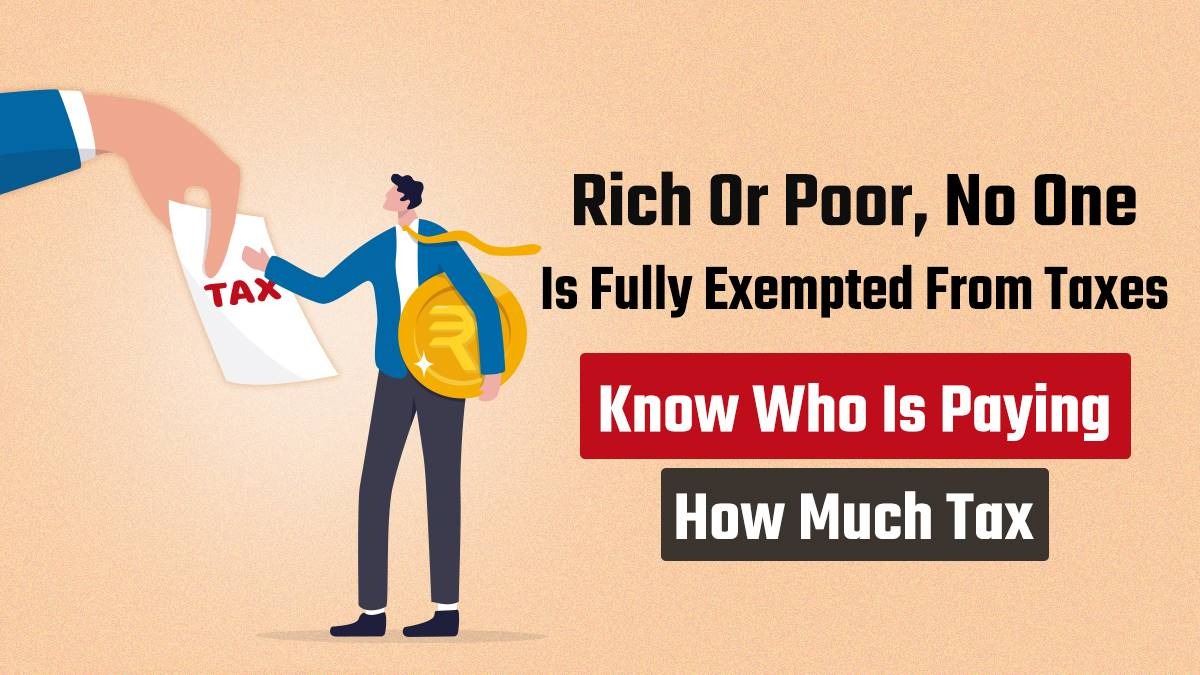- By Priyanka Payal
- Thu, 23 Mar 2023 02:16 PM (IST)
- Source:JND
New Delhi | Skand Vivek Dhar: We Indians have often heard that in our country only a selected few people pay taxes. However, in reality, this is only about income tax, which is easily generalised. The government earns more than three times of income tax from indirect taxes which directly come from the pockets of the common man. To understand this in a better way, let us have a look at the figures for the financial year 2021-2022.
In FY21-22, Rs 6.73 lakh crore was deposited as income tax, while Rs 14.83 lakh crore was collected through GST, Rs 3.90 lakh crore through excise on petrol and diesel, while Rs 1.99 lakh crore was collected from customs. This indicates that as compared to Rs. 6.73 lakh crore paid by Indians as income tax, Rs 20.73 lakh crore were collected from indirect taxes.
A common man in India, whose earnings can range from Rs 15,000 a month to lakhs of rupees a month, can be a salaried person, a businessman or a retired old man. So, how much tax this common man has to pay to the government on which items under normal circumstances? To find this out, Jagran Prime collected the details of the expenses of six real people (names have been changed to protect their privacy) from different cities in the country.
With the help of experts from one of the country's top fintech companies, BankBazaar.com, we studied different types of tax (income tax, GST, excise, VAT) components out of those expenses. Due to technical reasons, we have excluded STT, House Tax etc. from this study. We have also ignored any major expenses such as buying a house or a car in our study.
The results were shocking as we found that a person earning Rs 2.40 lakh a month is paying almost a quarter of his income as tax to the government (central and state government). Senior citizens who get Rs 80,000 as a pension are paying their one month's income as tax in a year. Even a youth with an income of Rs 15,000 is paying a tax of nearly Rs 8,000 annually.
How To Save Tax?
We also spoke to experts to know how these six people can reduce their tax burden. Chartered Accountant Sudhir Halakhandi says if one is living in a rented house and paying income tax, then buying a home loan can be a profitable deal. An income tax deduction is available on home loan interest of up to two lakhs per annum. A tax deduction on the principal amount can also be availed under Section 80C of the income tax act.
Similarly, if one is planning to buy a car one can go for an electric vehicle. Income tax exemption can also be taken on the loan of electric vehicles. Chartered Accountant Kirti Joshi says, it is very difficult to avoid GST, but a little awareness can reduce the burden of GST.
Citing an example, Joshi says that non-branded packets of food items like flour, and pulses above 25 kg are exempt from GST. In such a situation, buying these products can save you from GST. Similarly, instead of eating food in a five-star facility, you can choose some other restaurant. This not only reduces your bill but your GST is also reduced to 5% instead of 18%.
1679556877533.jpg)
Contrary to the popular belief, even senior citizens are required to pay taxes under various heads. Under the new tax system, Asthana was able to save an additional tax of about Rs 20,000, yet he had to pay a tax of about Rs 70,000 in a year, which is almost equal to his one month's pension.
1679556936300.jpg)
Makarand is taking advantage of almost all types of deductions in income tax. However, if he is willing to buy a new car, he can avail further income tax deduction by purchasing an EV through a loan. By giving up the habit of eating in five-star hotels, he can bring down the GST amount that needs to be paid.
1679556995415.jpg)
Vandana is currently giving one-third of her earnings to the government in one form or the other as tax. However, she can reduce the tax burden by taking a home loan or a loan for EV.
1679557031463.jpg)
Surendra Kumar pays most of the tax on buying diesel. A shift to CNG vehicles or EVs instead of diesel, can help them save tax, and reduce the input cost of their business.
1679557090776.jpg)
Atamjit and Vaibhav have little scope to save tax. However, if they wish, they can save GST by purchasing non-branded packets of food items above 25 kg such as flour, and pulses.

